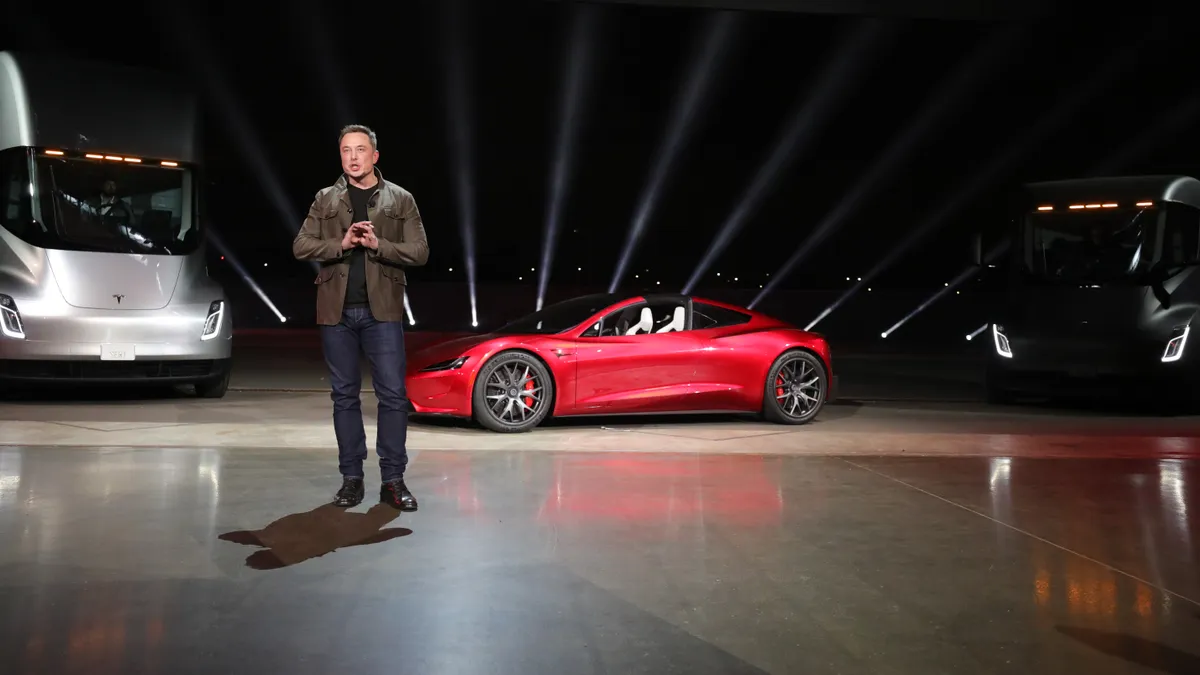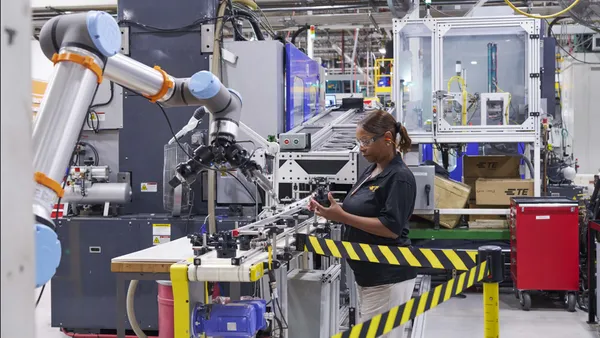Dive Brief:
- Fortigo Freight, a Canadian 3PL, announced its reservation of one of Tesla Motors' new fully electric semi-trucks. DHL followed with a similar announcement, reserving 10.
- Last week Tesla officially launched its fully electric semi-truck — which can accelerate 0-60 mph in 20 seconds with a full load (as opposed a diesel truck's 60 seconds) — and features similar specs to Tesla's other vehicles including regenerative braking, Autopilot and enhanced safety protocols, which include automatic lane keeping, emergency braking and lane departure warning.
- Within hours of Tesla's unveiling, J.B. Hunt and Walmart ordered "multiple" trucks for testing, even though Tesla isn't the only one innovating in the space. According to an interview with Fortigo, Tesla's artificial intelligence (AI) is what makes its trucks so attractive.
Dive Insight:
Big companies in the supply chain are very interested in Tesla's new semi trucks — and while some say it's all hype, if Tesla can deliver, its trucks could revolutionize the trucking industry. Despite Tesla's rampant supply chain problems, especially with its new Model 3, investor confidence in the business sector remains high.
The price of the semi is expected to be $150,000 for the 300-mile range model and $180,000 for the 500-range model.
That's good for Tesla, considering its recent failings, but it isn't a guarantee that the Tesla semi truck will be the one to sweep the market. In an interview with Supply Chain Dive, Fortigo's President Elias Demangos said part of the draw to Tesla over other electric semi truck manufacturers is its brand.
"The brand speaks to innovation and technology," he told Supply Chain Dive. "The joke around [Fortigo] is that technology and innovation are in our DNA."
More specifically, Demangos said it's Tesla's AI that's so attractive. Like its personal vehicle counterparts, Tesla's new semi-truck comes fully equipped with Autopilot, but the AI in the vehicles also adjusts to your personal preferences, including favorite radio stations, seat adjustments and vehicle temperature.
In a personal sedan, that's a luxury. In a semi-truck, that's a business opportunity.
Because Fortigo uses a mobile app, Demangos said it will be able to sync with Tesla's AI and provide live updates to Fortigo's customers about where the truck is and how soon it will arrive. Furthermore, the AI can help the driver plan his route better.
"Before the driver gets to the truck, the truck knows what the day is going to look like," Demangos said. That includes weather patterns, traffic conditions, cargo stops and load size. "It's full visibility, full integration," he said.
According to Demangos, Tesla's competitors "aren't fully electric," and Tesla's tech platform meets Fortigo's tech-savvy requirements.
Of course, as the trucking industry moves toward becoming fully electric, not everyone is going to pick Tesla to supply their electric semi-trucks. Nikola Corp., for example, is working on its own hybrid electric trucks, and the Port of LA is using Toyota's fuel cell trucks to move port freight and Cummins already unveiled its own fully electric semi-truck in August.
Because ample competition, the winners will be those who can produce working electric trucks without safety hazards or software glitches. If they all deliver, then it'll just be a matter of preference, and right now Tesla is strongly preferred because of its brand authority and aggressive innovation.
Tesla's success in this arena, then, will depend on whether it can pull its supply chain together to support its current lead over the competition.














